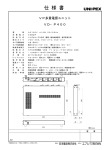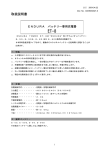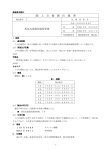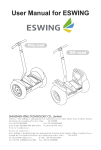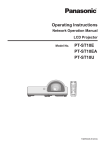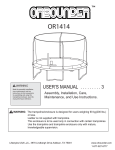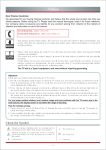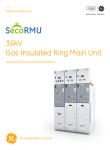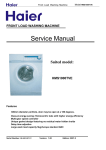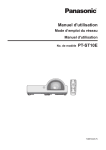Download VB2 Plus Circuit Breaker User Manual
Transcript
VB2 Plus Circuit Breaker User Manual Safety Instruction Thank you very much for using SecoVac VB2 Plus type indoor MV vacuum circuit breaker referred to produced by Shanghai GE Breakers Co., Ltd. To help you install and operate this breaker safely and effectively, please read this manual carefully and install, operate and maintain it according to this manual as well as installation codes and operation procedures related to electrical equipment. Precautions Delivery Please comply with the following precautions for your safety: Upon reciept of the breakers , the following inspection must be • Select the breaker according to operating conditions, otherwise done: it will result in faults such as damage to insulation, short-circuit and overheating • Check that rated operating parameters of the breaker are not exceeded during service • Check the goods for loss and damage (such as subjected to water or dirt) • If there is any shortages,defects or damages,take notes and if possible photogroaphs of the affected units and notify GE immediately • Ensure that installation, operation and maintenance are carried out only by qualified operators who have received relevant training. The replacement of parts should be done by qualified electricians or GE service staff • Be sure that the breaker is open before it moves from test position to service position • The main circuit and control circuit must be deenergized during the maintenance and inspection, the breaker must be drawn out of the switchgear and earth switch closed Transport and Handling Loading/unloading of the breaker units must only be carried out with either a crane if possible Do not lift circuit breaker by inserting fork lift or trolly ties directly under it.Use a pallet or other support material between the circuit breaker and fork/trolley Notes: - Avoid impact during handling - Do not subject to the mechanical damage Important: • Lifting breaker must not be attached to the breaker poles or parts of the operating mechanism. Use lifting bores and lifting lugs Table1: The weight of circuit breakers Version Pole centre distance (mm) Rated current (A) Rated short-circuit breaking current (kA) Weight (kg) Fixed 150 630~1250 31.5 115 Withdrawable 150 630~1250 31.5 125 Fixed 275 1250~2000 40 178 Withdrawable 275 1250~2000 40 208 Fixed 275 2500~4000 40 247 Withdrawable 275 2500~4000 40 297 Contents Introduction Summary Type Service Conditions/ Storage Normal service conditions Special service conditions Storage 1 1 1 1 1 2 2 Technical Data 3 Overall Dimensions 4 Internal Wiring Diagram 7 Structure 9 Overview Primary circuit Operating mechanism Working Principle Vacuum interrupter Operating mechanism 7 7 7 10 10 10 Installation 12 Maintenance 14 Documents and Accessories 16 Introduction Summary The SecoVac VB2 Plus circuit breaker elaborately designed by GE Energy for three-phases A.C up to 17.5kV rated voltage, and can be used for in controlling and protecting electrical equipment in industrial, mining, power plants and substations applications. The product conforms to IEC62271-100. The breaker can be installed in the switchgear in fixed or withdrawable arrangements. It is the optimum choice for the control and protection of MV power systems. Type SecoVac VB2 Plus - □ / T □ - □ □ W: Withdrawable, F:Fixed Rated short-circuit breaking current (kA): 25,31.5,40 Rated current (A): 630,1250,1600,2000,2500,3150,4000 (Forced cooling) Spring operating mechanism Rated voltage: 7.2kV,12kV,17.5kV SecoVac Series VB2 Plus type vacuum circuit breaker Service Conditions Normal service conditions • Unless otherwise specified, SecoVac VB2 Plus circuit breakers, including the operating devices and the auxiliary equipment which form an integral part of them, are intended to be used in accordance with their rated operating parameter and normal service conditions listed as follows • The ambient air temperature does not exceed 40℃ and its average value, measured over a period of 24h, does not exceed 35℃. The minimum operating ambient air temperature is -15℃. (storage and transportation is allowed at -30℃) • The altitude does not exceed 1000m • The ambient air is not significantly polluted by dust, smoke, corrosive and/or flammable gases, vapours or salt 1 • The conditions of humidity are as follows: – The average value of relative humidity, measured over a period of 24h, does not exceed 95% – The average value of water vapour pressure, measured over a period of 24h, does not exceed 2.2kPa – The average value of the relative humidity, measured over a period of one month, does not exceed 90% – The average value of water vapour pressure, measured over a period of one month, does not exceed 1.8kPa • Seismic intensity is not more than Zone4 Service Conditions Special service conditions If the actual service conditions differ from the normal service conditions, The circuit breaker and associating devices and auxiliary equipment shall be designed and made to comply with any special service conditions required by the user which must be discussed with GE in advance. Normally, the following special service conditions will be encountered: • At sites with altitude above 1000m, the effects of the reduction in dielectric strength of the air must be taken into account. GE can supply circuit breakers which can be applied in areas less than 3000m above sea level. At this time, the insulation level in switchgears should be taken into account and must be discussed with GE in advance • The ambient temperature is above 40℃. The service current of circuit breaker shall be derated at certain factor, or fans shall be installed for heat dissipation. Please confirm with GE in advance Attentation: • When circuit breakers are operated in areas with high humidity and/or major rapid temperature fluctuations, there is a risk of condensation, thus – Put the circuit breaker into operation as soon as possible after the package is dismantled – Put on the heater into service as soon as possible after the switchgear is installed – Please consult GE special application conditions Storage • The product is applicable to normal transportation conditions, i.e. highway (floor above level 3) and pay attention to waterproofing • Do not store product other than as indicated on packaging.Damage is possible if stored on side/back or top • If immediate installation is not possible, basic package is required or original package is maintained. After inspection and stored, the circuit breaker should be switched off and the spring mechanism should be discharged • The product shall be stored in dry and ventilated indoor place free of dust severe contamination, chemical corrosion and vibrations. The climate condition conforms to related specifications in IEC 62271-1 and adequate air circulation shall be maintained. The store room temperature shall not be lower than -30℃. Check periodically to avoid condensation inside breaker 2 Technical Data Electrical Parameter Table2 Rated Voltage kV 3.3~12 15 17.5 Rated Current A 630/1250/1600/2000/ 2500/3150/4000* 630/1250/1600/2000/ 2500/3150/4000* 630/1250/1600/2000/ 2500/3150/4000* Rated Power Frequency Withstand Voltage (1min)) kV 28 36 38 Rated Lightning Impulse Withstand Voltage (Peak Values) kV 75 95 95 Rated Short Circuit Breaking Current kA 25/31.5/40 25/31.5/40 25/31.5/40 Rated Short Time Withstand Current (3s) kA 25/31.5/40 25/31.5/40 25/31.5/40 Rated Peak Withstand Current kA 65/82/104 65/82/104 65/82/104 Rated Peak Making Current kA 65/82/104 65/82/104 65/82/104 Capacitor Bank Switching Current A 400 (C2) Electrical Endurance No. of Times E2 Mechanical Endurance No. of Times 10,000 (M2) V 36/48/60/110/220/240V DC 110/220V AC Opening Time ms 35~70 Breaking Time ms 25~35 Closing Time ms 40~50 Frequency 50/60Hz Rated Auxiliary Control Voltage Control circuit data Table3: Motor Rated voltage (V) Normal operation voltage range Energy storing period under rated operation voltage (s) Input Power (W) 110 DC 85%-110% <15s 150 125 DC 85%-110% <15s 150 220 DC 85%-110% <15s 150 110 AC 85%-110% <15s 150 220 AC 85%-110% <15s 150 Table4: Coils Rated voltage (V) Rated current (A) Rated voltage (V) Rated current (A) Rated voltage (V) Rated current (A) Rated voltage (V) Rated current (A) DC 24** 23.3 DC 30** 14.6 DC 36 11.5 DC 48 8.4 DC 60 5.6 DC 110 2.2 DC 220 1.1 AC 110 2.2 AC 220 1.1 * 4000A is VCB with force cooling. ** 24V, 30V plesse contact GE. 3 Overall Dimensions SecoVac VB2 Plus/T630~1250A-25~31.5kA (Phase to phase distance: 150mm) 488 637 275±1 ØD 201.5 e ጀᅪƽ 78 280±1 户内高压真空断路器 Vacuum circuit breaker GE Consumer & Industrial Systems 产 品 型 号 Type designation 出 厂 编 号 Serial number 额 定 电 压 kV Rated voltage(Ur) 额 定 电 流 A Rated normal current(Ir) 额 定 频 率 Hz Rated frequency 额 定 雷 电 冲 击 耐 压 (峰值) kV Rated lightning impulse withstand voltage(Up) 额 定 短 路 开 断 电 流 kA Rated short-circuit breaking current(Isc) 额 定 短 时 耐 受 电 流 kA Rated short time withstand current (4s) 额 定 电 缆 充 电 开 断 电 流 A Rated cable-charging breaking current 电 机 电 压 V motor voltage 分 闸 合 闸 装 置 电 压 V Rated supply voltage of closing and opening devices 执 行 标 准 Relevant standarder 额 定 操 作 顺 序 O-0.3s-CO-180s-CO Rated operating sequence 重 量 kg Weight 出 厂 日 期 Manufacture date ߛუླ၃ƽ൩ჹ߭ፏ֡ፕࡀײă Warning! 95.5 High voltage dangerous! Always observe the instruction manual and follow the rules. 上 海 通 用 电 气 开 关 有 限 公 司 76 Shanghai GE Breakers Co.,Ltd. 436±1 150±1 492±1 (456) Withdrawable 150±1 Terminal section 150 32 599±1 502 516 531 ∅62 150 451.5 275 M16 Depth 22mm GE Engery 户内高压真空断路器 Vacuum circuit breaker 4-M12 kV A Hz kV kA 237 e Industrial Solutions 产 品 型 号 Type designation 出 厂 编 号 Serial number 额 定 电 压 Rated voltage(Ur) 额 定 电 流 Rated normal current(Ir) 额 定 频 率 Rated frequency 额 定 雷 电 冲 击 耐 压 (峰值) Rated lightning impulse withstand voltage(Up) 额 定 短 路 开 断 电 流 Rated short-circuit breaking current(Isc) 额 定 短 时 耐 受 电 流 Rated short time withstand current (3s) 额 定 电 缆 充 电 开 断 电 流 Rated cable-charging breaking current 电 机 电 压 motor voltage 分 闸 合 闸 装 置 电 压 Rated supply voltage of closing and opening devices 执 行 标 准 Relevant standarder 额 定 操 作 顺 序 Rated operating sequence 重 量 Weight 出 厂 日 期 Manufacture date kA A V V 注意! 高压危险!请严格遵守操作规程。 Warning! 2V&2V&2 2V&2V&2 kg High voltage dangerous! Always observe the instruction manual and follow the rules. 上 海 通 用 电 气 开 关 有 限 公 司 Shanghai GE Breakers Co.,Ltd. 370 450 45 275 118 443 Fixed type 4 Overall Dimensions SecoVac VB2 Plus/T1250~4000A-40kA (Phase to phase distance: 275mm) 838 735 310 ±1 Ø109 376.5 e 户内高压真空断路器 Vacuum circuit breaker kV A Hz kV kA kA A V 86 295±1 GE Consumer & Industrial Systems 产品型号 Type designation 出厂编号 Serial number 额定电压 Rated voltage(Ur) 额定电流 Rated normal current(Ir) 额定频率 Rated frequency 额 定 雷 电 冲 击 耐 压 (峰值) Rated lightning impulse withstand voltage(Up) 额定短路开断电流 Rated short-circuit breaking current(Isc) 额定短时耐受电流 Rated short time withstand current (4s) 额定电缆充电开断电流 Rated cable-charging breaking current 电机电压 motor voltage 分闸合闸装置电压 Rated supply voltage of closing and opening devices 执行标准 Relevant standarder 额定操作顺序 Rated operating sequence 重量 Weight 出厂日期 Manufacture date 注意! V 高压危险!请严格遵守操作规程。 Warning! O-0.3s-CO-180s-CO High voltage dangerous! Always observe kg the instruction manual and follow the rules. 上海通用电气开关有限公司 76 Shanghai GE Breakers Co.,Ltd. 852 864 881 275±1 95.5 361±1 586±1 39 Withdrawable 836±1 (794) 275±1 Terminal section 30 275 27 110 275 100 ∅80 451.5 310 4-M10 (20mm in depth) GE Engery 户内高压真空断路器 Vacuum circuit breaker 4-M12 kV A Hz kV 252 e Industrial Solutions 产 品 型 号 Type designation 出 厂 编 号 Serial number 额 定 电 压 Rated voltage(Ur) 额 定 电 流 Rated normal current(Ir) 额 定 频 率 Rated frequency 额 定 雷 电 冲 击 耐 压 (峰值) Rated lightning impulse withstand voltage(Up) 额 定 短 路 开 断 电 流 Rated short-circuit breaking current(Isc) 额 定 短 时 耐 受 电 流 Rated short time withstand current (3s) 额 定 电 缆 充 电 开 断 电 流 Rated cable-charging breaking current 电 机 电 压 motor voltage 分 闸 合 闸 装 置 电 压 Rated supply voltage of closing and opening devices 执 行 标 准 Relevant standarder 额 定 操 作 顺 序 Rated operating sequence 重 量 Weight 出 厂 日 期 Manufacture date kA kA A V V 注意! 2V&2V&2 2V&2V&2 高压危险!请严格遵守操作规程。 Warning! kg High voltage dangerous! Always observe the instruction manual and follow the rules. 上 海 通 用 电 气 开 关 有 限 公 司 Shanghai GE Breakers Co.,Ltd. 720 34.5 275 788 Fixed type 5 118 SecoVac VB2-Plus L-frame Dimension b 1250A, 31.5kA (650mm) c a d b 3150A, 40kA (1000mm) c a d Table5 Unit 1250A, 31.5kA (650mm) 3150A, 40kA (1000mm) Width (a) mm 632 982 Height (b) mm 1031 1139 Depth (c) mm 747 735 Depth (d) mm 209 240 6 Internal Wiring Diagram Withdrawable type 26 Spring Charge Motor Closing Circuit 25 10 24 Breaker Interlock Circuit V2 (53) S5 (3) (14) S3 36 (22) S1 34 35 2 11 4 S9 14 21 43 22 S5 44 S9 34 13 33 34 S8 21 22 51 50 14 24 24 V5 A~ C+ B- K0 ZC (11) (74) S5 S5 (12) 91 31 41 71 61 63 23 33 83 93 92 32 42 72 62 64 24 34 84 94 S5 (2) S8 43 44 S9 54 31 32 16 13 15 17 19 33 37 38 39 18 40 55 S9 54 53 54 S8 S8 81 S5 82 12 S5 14 48 49 58 56 S9: Limit switch (service position) CC: Closing coil KO: Anti-pumping relay (optional) S8: Limit switch (testing position) TC: Trip coil BC: Electromagnet for locking (optional) S4: Electromagnet for locking's auxiliary switch M: Spring Charge Motor ZC: Electronegnet for locking truck (optional) S5: Auxiliary switch V1~V4: Rectitier S1~S3: Energy storing travel switch Note: 1. This wiring diagram describes that a breaker is open, racked to test position with spring in discharge state. 2. The polarity in dashed frame should be connected to common DC voltage terminal. 3. Rectifier will be removed if DC is applied. 7 D~ 2 53 S9 23 S8 13 S5 57 23 33 13 14 47 1 8 BC 53 20 29 Y4 1 43 44 S3 9 23 27 28 V3 (73) (54) S5 (5) (22) 7 TC S4 (21) 5 S2 M (51) (52) Truck Interlock Circuit 3 6 CC K0 (13) (14) (13) 30 V4 V1 (21) Opening Circuit 52 Fixed type Spring Charge Motor Breaker Interlock Circuit Opening Circuit 30 52 10 25 24 26 Closing Circuit V2 M S4 S5 (73) (54) S5 (74) (3) (13) (14) 36 35 2 43 S5 44 S5 21 22 (11) S5 (12) S5 91 31 41 71 61 63 23 33 83 93 92 32 42 72 62 64 24 34 84 94 S5 (2) K0 (22) S1 11 22 8 (21) S3 34 21 9 23 27 28 29 BC (53) (5) (22) S3 7 TC (13) (14) S2 (21) 5 CC K0 (51) (52) 3 V3 V4 V1 6 50 51 31 32 16 13 15 17 19 33 37 38 39 18 4 13 81 14 S5 82 12 20 S5 14 S4: Electromagnet for locking's auxiliary switch CC: Closing coil KO: Anti-pumping relay (optional) S5: Auxiliary switch TC: Trip coil BC: Over current release coil(optional) S1~S3: Energy storing travel switch M: Energy storing motor ZC: Electromagnet for locking (optional) V1~V4: Rectifier C: control Note: 1. This wiring diagram describes that a breaker is uncharged and is in an opening state. 2. The polarity in dashed frame should be consistent when the operation voltage is direct current. 8 Structure Overview Primary circuit The SecoVac VB2 Plus Vacuum circuit braaker uses a vacuum The primary circuit is made up of cluster upper arms, lower interrupter for the making and breaking of electric power arms and embedded poles (figure 1). The vacuum interrupters and circuit. The movable primary cluster contacts on the breaker main contact parts are embedded in epoxy resin using APG are connect with fixed primary contacts in switchgear and a process, which ensure the vacuum interrupters are protected secondary disconnectable plug connects with the secondary from the (ambient influence and) mechanical damage. circuit of the switchgear. The operating mechanism is equipped with spring compact charging mechanism. The mechanism adopts modular design method and some parts have multiple functions. 1 1 2 3 2 4 5 3 6 4 Figure 2. Front facia of the circuit breaker 1. Tripping button 2. Status indicator for charging 3. Closing button 4. Counter 5. Indicator for open or close 6. Charging handle Figure 1. Primary circuit 1. Upper arm 2. Embedded poles 3. Lower arm 4. Cluster Operating mechanism The spring operating mechanism consists of a single module. The operating mechanism is equipped with manual charging device which uses the charging handle and an electric charging device which charges the spring via a motor. The mechanism has reclose function. On the front facia of the circuit breaker, there are Open/Close, Charged/Discharged indicators and manual operating handle. The operator can operate remotely by electric power or manual and the status of the circuit breaker can be observed on the front facia (figure 2). The circuit breaker can be either opened or closed by the push buttons on the breaker or remotely via the closing coil and shut trip. Table6: Indicators on the VB2 Plus circuit breaker Energy charged status indicator 9 Closing-opening status indicator Manual closing & tripping buttons The spring is charged The circuit breaker is close Manual closing button The spring is discharged The circuit breaker is open Manual tripping button Working Principle Vacuum interrupter The vacuum pressure within the evacuated envelope of vacuum interrupter is less than 10 -5 torr. Under normal operating conditions the interrupter is closed. Arcing is established within the interrupter by withdrawing the moving contact from fixed contact. Arc burns in the metal vapor released from the contact surfaces. The metal vapor continually leaves the innercontact region and recondenses on the contact surfaces and surrounding metal vapor condensation shield. The latter is usually isolated from both contacts and serves to protect the glass or ceramic envelope from vapor deposition. At current zero, vapor production ceases and the original vacuum condition is reinstated. The dielectric strength of the interrupter also increases, and the current is interrupted. When the contacts in the open position, the circuit voltage is withstood internally by the inter-contact gap and externally by the insulating envelope. Operating mechanism 1 6 4 3 Figure3 Charging operation 1 Embeded pole 2 Insulating rod 3 Opening spring The energy that is necessary for closing the circuit breaker is provided by the closing spring. The energy storage can be operated by motor, or by the manual charging handle. Spring charged by motor: The spring charging mechanism consists of a spring charging motor, gear wheel, cam, holder and closing spring. When the energy-storing motor (11) is charging, the pinion of the output shaft (12) that is connected to motor will rotate, which drives the gear wheel. The holder fixed on the gear wheel will rotate the cam fixed on the shaft to move, which then drives the shaft to rotate, so that draws out the closing springs (17) for storing energy. When the block on the gear wheel is pushed away, the clutch is separated and the holder (4) will hold the roller on the cam (5) to keep the mechanism in charged, thus the charging operation is completed. Spring charged manually: When Spring is charged by manual means you can just push the Spring-charging handle on the mechanism up and down repeatedly, to store the above-mentioned spring-charging process. When the charging operation is complete, you can hear strong cranking sound, and the spring charging indicator (13) will show charged, as well as the status of position switch (6) will cut the secondary supply to charging. The operating mechanism is ready for the next operation. (Figure 3) 2 5 4 Holder 5 Cam 6 Position switch 7 17 8 9 10 16 15 11 14 13 12 Figure4 7 Closing coil 8 Holder 9 Close/open indicator 10 Main shaft 11 Motor 12 Output shaft 13 Charging indicator 14 Lock electromagnet 15 Over-current release 16 Tripping coil 17 Closing spring 10 Closing operation Tripping operation When the closing coil is energized the holder(4) will rotate When the breaker receives an opening command (the opening counter- clockwise to break away from the roller on the cam pushbutton is pressed or the tripping coil (16) is energized), the (5). The cam, under the action of the force from closing spring tripping shaft will rotate clockwise. Under the action of opening (17), will perform clockwise rotation, to push the roller on the spring (3) and contact wipe spring, main shaft will move main shaft , which will cause the main shaft (10) to rotate clockwise, and the insulating rod (2) will make the movable counter clockwise. The main shaft moves the connecting rod contact separate from the fixed contact. The buffer will absorb down through arm, so that the insulating rod (2) moves upright, the residual energy and tripping operation is completed. which pushs the movable contact to the fixed contact with After the tripping operation is finished, The closing/opening the required speed, and then compresses the contact spring indicator (9) will indicate "open". Meanwhile, the counter will and causes contact travel, to ensure the pressure is generated record the operation. between movable and fixed contacts. After the closing operation is finished, the closing/opening indicator (9) will indicate "Close". The power to the closing circuit will be removed. If the external power supply is maintained, the charging circuit will recharge the spring. Reclosing Auto Reclosing When the circuit breaker is in the closed condition, the Interlocks The following interlock are incorporated to insure the safe operation of the breaker. • When the breaker is in the closed condition, the withdrawable circuit breaker racking between the service position and test position is not possible • When the earth switch is in close condition,, the withdrawable circuit breaker racking into the service position is not possible • When the withdrawable circuit breaker is in service position, the earth switch can not be closed • When no voltage is applied to the interlock circuit then the breaker can not be closed 11 mechanism can be charged and ready to close, so that the circuit breaker can reclosed immediately after tripping. Anti Pumping When an attempt to close the breaker has been made, if the breaker doesn't successfully close then internal closing circuit of the breaker must be tripped with anti pumping relay Installation Correct installation is of primary importance, the manufacturer's instructions must be fully complied with to ensure safe and reliable operation. It is good practice to wear gloves for handling the breaker during the installation. Please carry out installation and wiring of this breaker according to this manual. Don't place tools or other objects on the breaker during installation.Wear appropriate personal protective equipment and safe lifting procedure. Check before installation Commissioning After the breaker is unpacked, check the breaker poles for any cracks and breakage. The product nameplate and product certificate shall conform with the order. Check goods according with the packing list. Clean the insulating parts with a clean dry cloth. Check the upper and lower terminals are clean and free of any deformation caused by shocks received during transport or storage. Check the vacuum interrupter through power frequency withstand voltage test. • All commissioning and operation work shall be carried out by persons who have received suitable training and understand the performance of the circuit breaker. Correct protective and preventive measures shall be taken during commisioning • Using the product under normal working conditions and within the range of technical data according to the standard of IEC 62271-1, which will ensure the correct performance of the circuit breaker • After the installation of the circuit breaker into switchgear, the breaker shall not be subject to any excessive stress Considerations 1. Operation for withdrawable circuit breakers • Put the circuit breaker into test position • Insert the handle and rotates the handle clockwise about 20 rotations. While a strong cranking sound is heard, the withdrawable* circuit breaker will be in the service position. (don't apply too much force, to avoid any damage) Note: Rotate anti-clock wise to rack out 2. Operation for fixed circuit breakers. • The careful and professional installation is a fundamental condition for the failure free operation of the circuit breaker • The circuit breaker installed in a switchgear cabinet shall not be subject to pulling & compressing or deforming and the disc washers are needed • When connecting the main terminal, don't cause the terminal to deform • When connecting the bus bar, the depth of the bolt must comply with requirement of drawings • Use the standard bolts with strength of Class 8.8 and the disc springs to tighten the bus bar (Table 7) • The circuit breaker installed in a switchgear cabinet shall comply with IP2X requirements when switchgear circuit breaker door opening • Provide insulator to support on busbar on less than 250mm position away from pole terminal Preparation work (Prior to energization) • Check the circuit breaker for any damage or any other dangerous environmental influence • Clean the dirt on the surface of insulator • The lifting hook of the circuit breaker must be removed prior to operation • Check the connecting status of the primary and secondary circuits as well as the earthing • Follow spring-charging, opening and closing operations manually ensure the breakers is operated properly Operation • For detailed operations, please refer to the working principle of the mechanism. Please check the status of the circuit breaker carefully prior to operation Table7: Tightening torque of bolts Basic dimensions of bolts (mm) M8 M10 M12 M16 Tightening torque without lubricant applied (N.m) 25 45 85 170 Tightening torque with lubricant applied (N.m) 10 25 45 80 * breaker position indicator will show the breaker in service position 12 Maintenance Maintenance rules • The user shall not replace any parts with different maker to original parts • Prior to maintenance, make sure that the circuit breaker is removed from the switchgear. It is necessary that the circuit breaker is in open closing spring, discharged and the power supply is cut off Check the withdrawable part • Check the holders, pins and terminals. Pay attention to apply lubricant grease and tightening terminals • Racking operation check and ensure the functions work properly • The replacement of the poles and operating mechanism should only be performed by GE authorized personnel Maintenance cycle • Regular maintenance shall be carried out once in every 5 years or every 2000 operations of the circuit breaker under normal operating condition • When there is any damaged insulation, damaged element in the mechanism refusal, refusal to open or close, as well as other abnormal conditions, maintenance inspection and testing shall be carried out • The circuit breaker, after 10000 times operation, shall be replaced. The circuit breaker, after 25 years operation, should be checked to determine whether it requires replacement The primary circuit • Check and clean the pole insulation and check the bolts for tightness to ensure good contact • Measure the clearance and over-travel of the circuit breaker • Carry out mechanical operating test to the circuit breaker by closing and opening 5 times respectively at rated operating voltage, high voltage and low voltage • Carry out mechanical characteristics test to the circuit breaker. Measure the opening and closing time, average speed, asynchronism, bouncing time, etc • Tighten the bolts and measure the resistance of main circuit • Measure the insulation resistance of the main circuit • Carry out power frequency withstand voltage test • The bolts applied in maintenance should be applied with anaerobic adhesive prior to installation Items checked during maintenance Operating mechanism • Visual check of all elements and mechanical Interlocks for any damage. If there is any damage, please replace in time • Check the tightening bolts and nuts and check the split pins for any breakage or falling loosening during operation • Check the driving and friction positions inside the mechanism, lubricant shall be applied to the moving and friction areas prior to installation • Check the counter for correct operation • Check and ensure the interlocks function • Check the oil buffer for oil leakage or any other damage. • Check the auxiliary switch and position switch for terminals and contacts • Check the motor • Check the closing, tripping and latch coils • Check the terminals of secondary circuit. Check for loose parts and re-tighten 13 The test for mechanical characteristics The value for mechanical characteristics should conform to technical data list. Maintenance Trouble shooting Table 8 Trouble Cause The coil has burned out Refuse to close The closing coil refuse to act The secondary circuit wiring has fault Refuse to open Connect the wirings again and confirm Check and replace Too low voltage for closing Measure the closing voltage and ensure it is within limit The terminal connection of the secondary wiring becomes loose/disconnected Check the secondary wiring and replace/ reconnect Overtravel too high Adjust the overtravel to the specified limit The withdrawable part is not in service position or test position Conform the position of withdrawable part in service position or test position The coil has burned out Replace the coil The secondary wiring is fault Check wiring and tighten the terminals Bad contact in auxiliary switch Check the auxiliary and replace Secondary operating voltage too low Measure the operating voltage and adjust the voltage The terminal connection of the secondary wiring becomes loose Check wiring and tighten the terminal The breaker can not open manually The withdrawable part is not in service position and test position Conform the position of withdrawable part in service position and test position Indicator for position falls S8 and S9 auxiliary switch fails or the withdrawable deforms Replace the auxiliary switch or repair the withdrable part by manufacturer Motor doesn't act The secondary wiring open or the motor burns out Check the wiring or replace the motor The motor can't stop Wiring or position switch failure Check the wiring or replace the position switch The closing coil act but the breaker dosen't close The Tripping coil refuse to act Others Replace the coil Bad contact of the auxiliary switch Electrical Electrical The Tripping coil act but the breaker doesn't open Mechanical Action 14 Dismantling and Installation of Components and Parts Removal and installation of auxiliary switch The pole and closing & tripping modules shall be replaced by Ensure all control supply is disconnected. As shown in figure 9, GE service technicians. The replacement of the parts should be remove the link (2) and remove the bolt (1), Take off the auxiliary in accordance to this manual. switch and the secondary wiring as required. Dismantling and installation of tripping & closing coils Removal and installation of position switch As shown in figure 10, firstly remove the secondary wiring (1) As shown in figure 7, disconnect the secondary wire (1) of and remove the bolt (2), then remove the position switch. The closing & tripping coils and unscrew the bolts at both sides. installation procedure is in the reverse order. Take out the support bracker of the tripping & closing coils and take off the coils. The installation process is in the reverse order. 1 Removal and installation of counters 2 As shown in figure 8, remove spring (2) and turn off screw (1), the counter can be removed. The installation procedure is in the reverse order. 1 Figure 9 2 1 3 2 Figure 7 Figure 10 1 Lubrication 2 VB2 Plus circuit breaker has a mechanical operation service life time is 10000 times. After each 2000 operations, lubrication is necessary. The following type of the lubrication is recommended: Figure 8 15 Mobilux EP Series • Silicone grease 102 Documents and Accessories Accompanying documents Accessories • Product certificate • Withdrawable part: Racking handle • Manual • Packing list Spare parts Some of the following spare parts are available. For ordering, please contact GE. Description Part No. Remarks Auxiliary switch F10-18 GDF5AA00 1 piece per set Auxiliary switch GDF-5 GDF5AC00 2 piece per set Opening coil P-C 1 piece per set Closing coil P-C 1 piece per set Micro Position switch LXW1811BZ1 3 piece per set Energy charge motor P-Motor 1 piece per set Counter P-AP200 1 piece per set Oil buffer P-BUFFER 1 piece per set Control wiring board P-AP910 1 piece per set Electromagnet for locking P-L 1 piece per set Electromagnet for locking truck P-L 1 piece per set 16 GE Energy GE Asia Headquarters China 4F, Building 2, CTP, No.1 Hua Tuo Rd. Zhang Jiang Hi-Tech Park Pudong, Shanghai 201203 T : +86 21 3877 7888 F : +86 21 3877 7600 GE Breakers Co.,Ltd 865 Nanqiao Road, Fengxian District, ShangHai 201400, China T: +86 21 6710 1900 F: +86 21 6710 1901 T : +61 2 8788 6911 F : +61 2 8788 7224 BRI II Tower, 27th floor Jl. Jend. Sudirman No. 44-46 Jakarta 10210 T: +62 21 573 0430 F: +62 21 574 7089 The Millenia, 6F, Tower B, #1&2 Murphy Road, Ulsoor Bangalore 560 008 T : +91 80 4143 4000 F : +91 80 4143 4199 11F, Akasaka Park Bldg.,5-2-20 Akasaka Minato-ku, Tokyo 107-0052 T: +81 3 5544 6780 F: +81 3 3589 3372 240 Tanjong Pagar Road #06-00 GE Tower Singapore 088540 T : +65 6326 3404 F : +65 6326 3015 3F, GE Tower, 71-3, ChungdamDong, Kangnam-Gu, Seoul 135-100 T: +82 2 6201 4501 F: +82 2 6201 4545 6F, No.8, Sec. 3, Minsheng E. Road Taipei 10480 T : +886 2 2183 7000 F : +886 2 2516 6829 Level 6, 1 Sentral, Jalan Travers, Kuala Lumpur 50470 T : +603 2273 9788 F : +603 2273 3481 7th Floor, Capital Tower, All Seasons Place 87/1 Wireless Road, Lumpini Pathumwan, Bangkok 10330 T : +66 2 648 0199 F : +66 2 648 0100 Level 1, 8 Tangihua Street. Auckland. North Island. 8F Net Cube Building, 30th Street Corner 3rd Avenue, Crescent West Park Global City Taguig 1634 T : +63 2 877 7000 F : +63 2 846 0629 T : +852 2100 6800 Printing Code: 110104-B

























